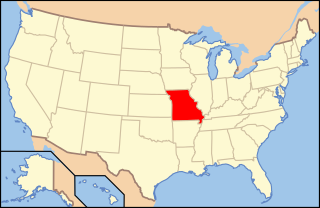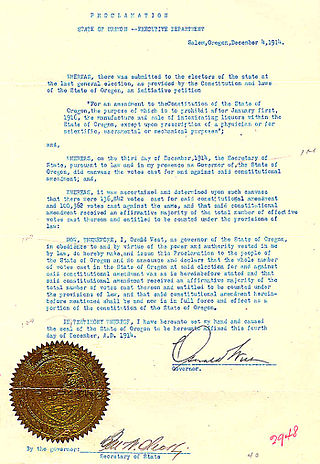
Prohibition is the act or practice of forbidding something by law; more particularly the term refers to the banning of the manufacture, storage, transportation, sale, possession, and consumption of alcoholic beverages. The word is also used to refer to a period of time during which such bans are enforced.

Happy hour is a marketing term for a time when a venue such as a restaurant or bar offers reduced prices on alcoholic drinks. Discounted menu items like appetizers are often served during happy hour. This is a way for bars and restaurants to draw in more business before or after peak business hours.

A liquor license is a governmentally issued permit for businesses to sell, manufacture, store, or otherwise use alcoholic beverages.
The Virginia Alcoholic Beverage Control Authority is one of the eleven public safety agencies under the Secretariat of Public Safety and Homeland Security for the Commonwealth. The agency administers the state's ABC laws. ABC stores are the only retail outlets in Virginia where customers may purchase distilled spirits. The profits that Virginia ABC contributes are collected from sales of distilled spirits at ABC stores, taxes collected on beer and wine sales, violation penalties and license fees. Since its establishment in 1934, Virginia ABC has contributed more than $9 billion to the Commonwealth's general fund. Virginia ABC employs more than 4,000 people statewide.

Oklahoma allows any establishment with a beer and wine license to sell beer and wine up to 15% ABV, under refrigeration.

The alcohol laws of Missouri are among the most permissive in the United States. Missouri is known throughout the Midwest for its largely laissez-faire approach to alcohol regulation, in sharp contrast to the very strict alcohol laws of some of its neighbors, like Kansas and Oklahoma.

The alcohol laws of Kansas are among the strictest in the United States, in sharp contrast to its neighboring state of Missouri, and similar to its other neighboring state of Oklahoma. Legislation is enforced by the Kansas Division of Alcoholic Beverage Control.

Alcohol laws of New York are a set of laws specific to manufacturing, purchasing, serving, selling, and consuming alcohol in the state of New York. Combined with federal and local laws, as well as vendor policies, alcohol laws of New York determine the state's legal drinking age, the driving under the influence limit, liquor license requirements, server training, and more.

The alcohol laws of Pennsylvania contain many peculiarities not found in other states, and are considered some of the strictest regulations in the United States.
Alcohol laws of Maryland vary considerably by county, due to the wide latitude of home rule granted to Maryland counties.

The U.S. state of Oregon has an extensive history of laws regulating the sale and consumption of alcoholic beverages, dating back to 1844. It has been an alcoholic beverage control state, with the Oregon Liquor and Cannabis Commission holding a monopoly over the sale of all distilled beverages, since Prohibition. Today, there are thriving industries producing beer, wine, and liquor in the state. Alcohol may be purchased between 7 a.m. and 2:30 a.m for consumption at the premise it was sold at, or between 6 a.m. and 2:30 a.m. if it is bought and taken off premise. In 2020, Oregon began allowing the sale of alcohol via home delivery services. As of 2007, consumption of spirits was on the rise while beer consumption held steady. That same year, 11% of beer sold in Oregon was brewed in-state, the highest figure in the United States.

The state laws governing alcoholic drinks in New Jersey are among the most complex in the United States, with many peculiarities not found in other states' laws. They provide for 29 distinct liquor licenses granted to manufacturers, wholesalers, retailers, and for the public warehousing and transport of alcoholic drinks. General authority for the statutory and regulatory control of alcoholic drinks rests with the state government, particularly the Division of Alcoholic Beverage Control overseen by the state's Attorney General.
Alcohol laws of Australia are laws that regulate the sale and consumption of alcoholic beverages. The legal drinking age is 18 throughout Australia. The minimum age for the purchase of alcoholic products in Australia is 18. A licence is required to produce or sell alcohol.

Alcohol laws are laws relating to manufacture, use, being under the influence of and sale of alcohol or alcoholic beverages. Common alcoholic beverages include beer, wine, (hard) cider, and distilled spirits. Definition of alcoholic beverage varies internationally, e.g., the United States defines an alcoholic beverage as "any beverage in liquid form which contains not less than one-half of one percent of alcohol by volume". Alcohol laws can restrict those who can produce alcohol, those who can buy it, when one can buy it, labelling and advertising, the types of alcoholic beverage that can be sold, where one can consume it, what activities are prohibited while intoxicated, and where one can buy it. In some cases, laws have even prohibited the use and sale of alcohol entirely.
The alcohol laws of Wisconsin consist of both statewide statutes and local ordinances governing the sale of alcohol.

Social customs and laws concerning drinking alcohol in public vary significantly around the world. "Public" in this context refers to outdoor spaces such as roads, walkways or parks, or in a moving vehicle. Drinking in bars, restaurants, stadiums, and other such establishments, for example, is not generally considered to be "in public" even though those establishments are open to the general public. In some countries, such as Norway, Poland, India and Sri Lanka, some states in the United States, as well as Muslim-majority countries where alcohol is legal, public drinking is almost universally condemned or outlawed, while in other countries, such as Portugal, Spain, Germany, the United Kingdom, New Zealand, Japan, Finland and China, public drinking is socially acceptable.
Blue laws, also known as Sunday laws, are laws that restrict or ban some or all activities on specified days, particularly to promote the observance of a day of rest. Such laws may restrict shopping or ban sale of certain items on specific days. Blue laws are enforced in parts of the United States and Canada as well as some European countries, particularly in Austria, Germany, Switzerland, and Norway, keeping most stores closed on Sundays.
The alcohol laws of Maine regulate the sale and possession of alcohol in the state of Maine in the United States. Maine is an alcoholic beverage control state.












